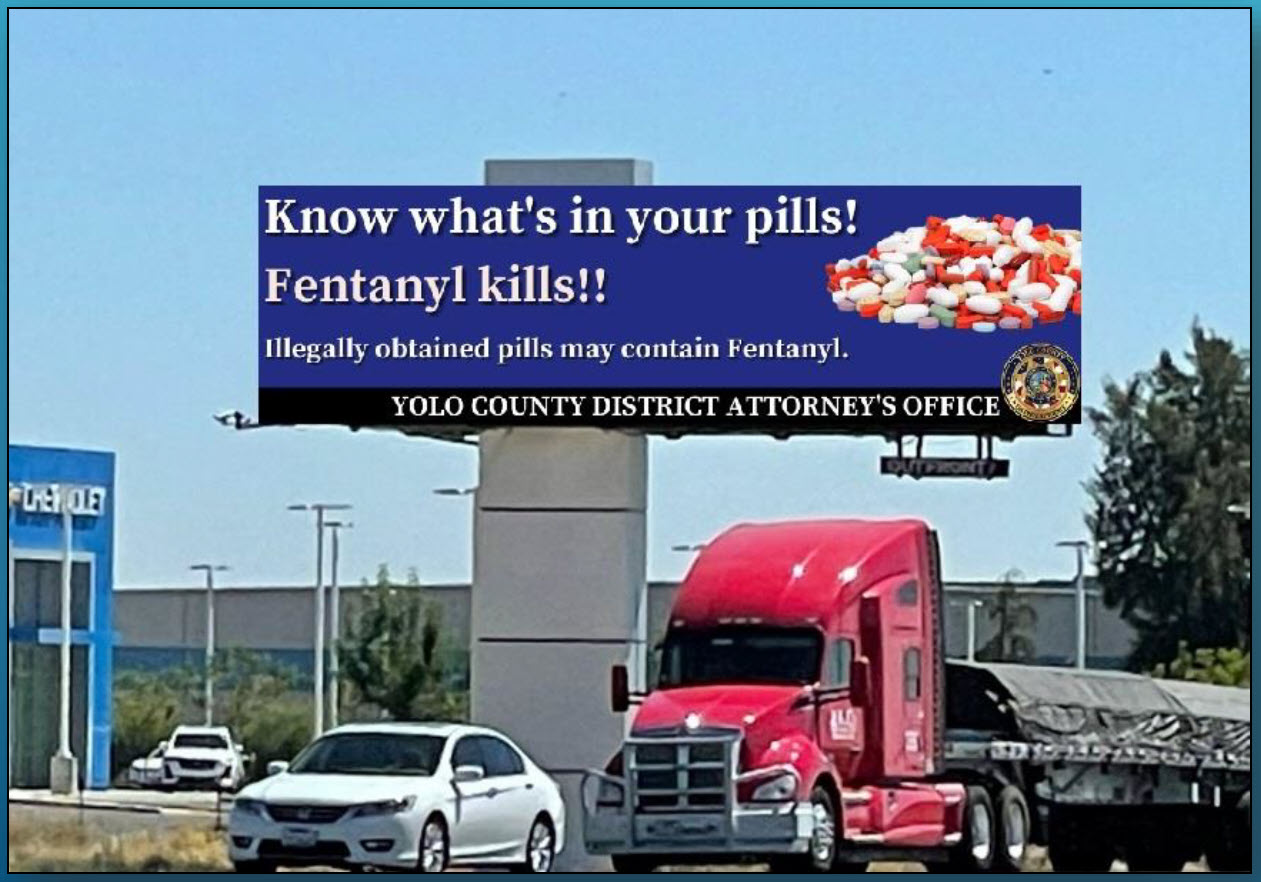

By David M. Greenwald
Executive Editor
The media continues to fan the flames on the fentanyl public health crisis which has spawned many county district attorneys to bring back often failed war on drugs policies.
Recently News 10 out of Sacramento did an extensive report, highlighting the efforts of 10 Northern California counties—including Yolo County—that have seen increases in fentanyl deaths.
DA Jeff Reisig told News 10 that there has been a sharp rise in the number of overdoses in the last several years, with most people dying being in their mid 20s to 30s.
“Davis has been particularly vulnerable to this. Think about it. It’s not surprising they tend to have a younger population. They have the college, and so we’ve seen a lot of fentanyl moving through Davis and the college population there,” Reisig told the news station.
The report notes for example that there has been an increase in fentanyl seizures, especially on the freeways, that Yolo has done an “aggressive outreach” and public education program, and that Yolo has announced a policy whereby the DA could charge with murder someone who sells drugs and a person dies of a fentanyl overdose.
“We are aggressively investigating every fentanyl death, and if we’re able to connect the dots to a dealer that had awareness or a prior conviction, we’re going to charge a homicide,” Reisig said.
Reisig said there have not yet been murder charges filed for a fentanyl death in Yolo County.
“I don’t think it’ll be a challenge at all to get 12 jurors from Yolo County to convict somebody of a homicide if they’re in that situation where somebody dies from taking their product,” Reisig said.
This is largely an uncritical look at the policies of the local DAs.
For instance, while the report focuses heavily on a policy that the DA has admitted they have yet to utilize, despite rolling it out over a year ago, they fail to note that there is a lot of controversy about the effectiveness of such punitive approaches.
The Drug Policy Alliance for one strongly disputes the notion that an overdose death is murder and argues that such laws are counterproductive as well as inhumane.
“In the 1980s, at the height of the draconian war on drugs, the federal government and a host of states passed ‘drug-induced homicide’ laws intended to punish people who sold drugs that led to accidental overdose deaths with sentences equivalent to those for manslaughter and murder,” DPA noted.
Further: “Enforcement of drug war policies has historically targeted black and Latino communities, and drug-induced homicide prosecutions appear to follow this pattern.”
DPA explains, “Unfortunately, the harms of a highly punitive response to drug use and sales expand far beyond the effects of the actual punishment. Indeed, criminalizing people who sell and use drugs, through means like drug-induced homicide charges, amplifies the risk of fatal overdoses and diseases by increasing stigma and marginalization and driving people away from needed medical care, treatment, and harm reduction services.”
There is no analysis by News 10 either about whether these hardline policies that the Yolo and other DAs have rolled out have been effective at all.
Nor did News 10 look at more progressive approaches to the fentanyl crisis.
For instance, two weeks ago, progressive LA County DA George Gascón has joined with LA Dept. of Public Health Director Dr. Barbara Ferrer to create a working group to address the fentanyl crisis through prevention, education and enforcement.
DA Gascón said he is “proud to announce that we are leading a multifaceted and collaborative effort to save lives…to support and utilize evidence-based and effective approaches to stopping the toll fentanyl is taking.”
Noting the failure of the “War on Drugs” from decades ago, which has taught “we cannot incarcerate our way out of a public health issue,” is a reason why the approach is necessary, said Gascón, adding the priority is to “[save lives] when addressing substance and illicit drug abuse, as only the living have the opportunity to recover.”
Last week in an op-ed the DA acknowledged the severity of the fentanyl problem, calling for a “war against fentanyl” but arguing “but we need to do it in a way that actually solves the problem, instead of destroying communities.” He said, “We’ve been good at the latter in the past, but not the former. I vow to change that.”
What that means is not using a carceral approach.
“As we fight to stem the harms of fentanyl, we cannot use tried-and-failed drug policies of our last drug war just because it’s politically expedient,” Gascón writes. “We will only stem the tide of the fentanyl crisis and save lives by using a different, more collaborative approach involving various stakeholders across the county; one that is grounded in comprehensive public health strategies that emphasize education and prevention in addition to targeted enforcement.”
Other DAs like San Francisco’s Brooke Jenkins have also reignited fears that the country is about to relaunch the failed war on drugs.
But there is a lot of push back against these punitive approaches—though one would not know it from reading or watching the News 10 report.
In October, San Francisco Public Defender Mano Raju along with an assortment of drug policy experts and treatment providers pushed back against DA Jenkins and her policies, urging evidence-based treatment and harm reduction approaches to address what they believe is a public health crisis.
Raju explained, “Fifty years of the war on drugs, which is estimated to have cost $1 trillion have demonstrated that arrests, prosecutions, and incarceration inflict more harm and do not reduce substance use disorders or drug sales.”
Raju explained, “Public defenders have been on the front line of this racist war that has targeted Black and brown communities for criminalization. And we know all too well the toll is taken on generations of communities of color.”
He added, “To be clear, as the historic War on Drugs has clearly demonstrated, criminalizing the supply has done nothing to reduce the demand.”
Laura Thomas, Director of HIV & Harm Reduction Policy with SF AIDS Foundation agreed, noting these policies will in fact “make it harder for them to stay safe, harder for them to achieve recovery.”
She said, “We know what does address and prevent overdose fatalities. And that’s where the people in the harm reduction world have the tools, as opposed to the criminal legal system. We need to disinvest in what doesn’t work, and that’s the criminal legal system.”
And yet, there is no discussion of this by the Yolo DA.


Several recent studies have shown clearly that the cause of the problem is economic distress caused by maldistribution of wealth. Unfortunately those who would need to give up some of their wealth instead are misdirecting attention towards the failed draconian solutions.